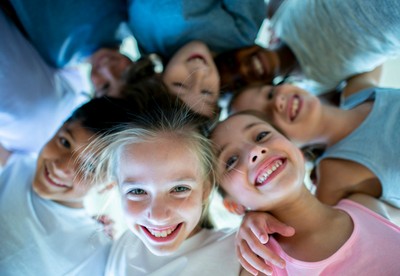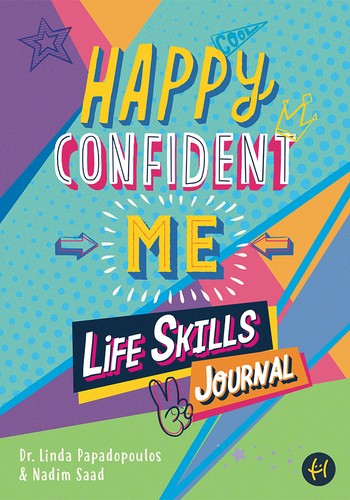
The Game-Changing Book Every Family Should Read
Books Like These Are More Important Than Ever
“The events of the last year have taken their toll on children. The pandemic has exacerbated the sense of overwhelm in children, many of whom are already struggling with information overload – kids today face many more choices and demands than previous generations have ever experienced. There has been so much focus around the importance of raising awareness for mental health, which is great, but the next step is looking at solutions. This book – Happy Confident Me Life Skills Journal – attempts to do just that by helping children develop a practical skill set that will allow them to more effectively manage their emotions and the problems they face.” – Dr Linda Papadopoulos, psychologist
It’s Perfect For 7-to-12-Year-Olds
“The book is designed to help seven to 12-year-olds develop ten key life skills, such as the power of introspection, optimism, mindset and resilience, through engaging, creative and thought-based activities. These skills – especially if developed from an early age – are recognised to help children achieve greater levels of happiness and self-confidence both in childhood and adulthood. If we don’t address these issues now, mental health problems will continue increasing and children will struggle to adapt to the big changes the world is going through.” – Linda
You’ll Get Help Fostering Better Emotional Intelligence
“Children need to learn psychosocial skills such as emotional intelligence, resilience and self-confidence. In fact, these account for 75% of achievement and success, against only 25% attributed to IQ. One of the key skills we focus on in the journal is enhancing emotional intelligence. Many children struggle to identify and articulate their feelings, which results in worsened internal worries, leading to heightened anxiety, depression, lower self-esteem and confidence. The journal also covers compassion, mental wellbeing and helps children learn from mistakes, among others.” – Nadim Saad, parenting expert and founder of The Happy Confident Company
The Whole Family Can Create New Habits
“Research shows our habits create our reality. The easiest and most effective way to make positive change is to make small daily changes. Over time, these little changes accumulate, and result in considerable change over time. We’ve identified seven positive habits – all based on psychological principles and research – to help the whole family become more positive, happier and more confident. Slowly introduce these positive habits one at a time until they become a natural part of your family routine:
-
Start The Day On A Positive: This will set you and the family up for the day ahead. Establish a morning routine that can slot in ahead of daily chores, even for just five minutes. This could be taking time for some positive affirmations with your children or doing jumping jacks with little ones to get the positive energy flowing. Or try to think about three things that would make your day a better one, for everyone.
-
Do More Of What Makes You Happy: Let you and your children define what this means for you – it could be spending more time with friends, listening to music or going for a walk. Encourage your children to define what this means for them. Whatever they choose, however big or small, this can be helpful to help your children develop self-understanding. With a better understanding of ourselves, we can do more of the things that make us happy.
-
Write Things Down: There is so much research to prove that by simply writing down three things you are grateful for each evening (or just three positives about your day), you’ll have greater optimism, be more satisfied with life, and be happier. No matter how big or small, it all counts. Help your kids get into this habit early in life – a colourful journal offers a great incentive and provides a great time for the whole family to share their challenges and feelings. It can be as simple as the weather or what they had for lunch. Daily journaling is also a great way to connect with your child by providing a time for them to confide in you by sharing their feelings, successes and challenges.
-
Practice Self-Talk: Turn your negative self-talk into positive – this counts for parents and children alike. Turn things like ‘I am so bad at this’ into ‘I am still finding this difficult; I need more practice.’ Helping your child to be more positive and identify their ‘inner bully’ can help them learn the art of positivity.
-
Avoid Negativity: It’s tricky to stay positive if you are surrounded by negativity, and this includes children. Social media is a world of comparison and can stir up negative feelings, so try to work on letting go of bad feelings so they don’t linger.
-
Don’t Be Tempted Into Absolutes: Words such as ‘never’ and ‘always’ create a sense of powerlessness as they imply things are unlikely to change. Encourage your child to replace the ‘I will never get better at this’ to ‘I will get better at this someday’.
-
Focus On What Matters: Teach your child to look at the bigger picture. If your child is struggling with something, ask them whether it will matter in a years’ time. If not, try to let it go by focusing on something more positive.” – Nadim
It's All About Journaling
“Our method uses the power of journaling. Just a few minutes of daily journaling is proven to develop self-awareness, positive thinking, resilience, growth mindset, confidence, mindfulness, kindness and gratitude. Structured journaling is a great way for children to develop the ability to identify their feelings, understand themselves and overcome challenges in a healthy way. Taking the time each evening to talk about the difficult things that have happened that day, and how they overcome them, shows children they can recover from uncomfortable emotions. Our journals also encourage conversations with peers, parents and carers about important themes, helping normalise and identify the many emotions experienced each day. Eye-catching and colourful designs along with daily questions, inspirational quotes and worry boxes are just some of the features that make the Happy Confident Me journals fun, rather than a chore.” – Nadim
It Can Ease The Back-To-School Transition
“While we can’t prevent children from experiencing back-to-school anxiety, we can make the transition easier by using a few tools that will prepare them emotionally and help them cope with the challenges that lie ahead. One of the best things you can do is actively listen. For example, if your child is worried about going to a new school, you should avoid saying ‘Your new school is going to be amazing and you’re going to make lots of friends.’ Instead, try to empathise with their feelings. To do this, try repeating what they are telling you (word for word, or in your own words), or try to name their feeling if they are sharing a story that has affected them. Once you have actively listened, you can ask them: ‘What are you going to do about it?’, or if it’s something that you can help with, ask them: ‘What can I do about it?’ Also consider scheduling in family time on a weekly or monthly basis to allow your family to discuss anything that may be bothering them. Planning ahead in this way makes the transition easier for children as they feel more prepared to better deal with the challenges that lie ahead.” – Nadim
The Happy Confident Me Life Skills Journal (£11.99), co-written by Dr Linda Papadopoulos and Nadim Saad, is available from 15th September in WH Smiths and online at HappyConfident.com.
DISCLAIMER: We endeavour to always credit the correct original source of every image we use. If you think a credit may be incorrect, please contact us at info@sheerluxe.com.
All products on this page have been selected by our editorial team, however we may make commission on some products.



